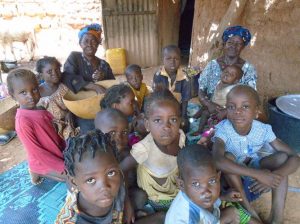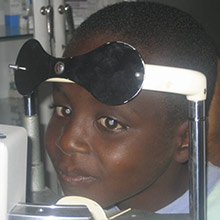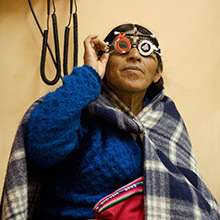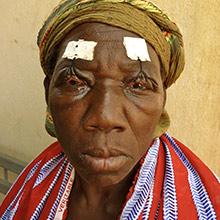Trachoma is the main infectious cause of blindness in the world and 157 million people are in risk of suffering it. It belongs to NTD, neglected tropical diseases, which, despite having an easy treatment, can result in chronical blindness if it is not stopped on time.
More than 80% of trachoma is concentrated in 14 countries of extreme poverty, where immediate action is required. Those are areas where there is not appropriate ocular hygiene neither access to water or sanitation, places where the infection finds its ideal scenario to appear and spread.
Repeated inflammation in the conjunctiva ends up affecting the edges of the eyelids and the eyelashes, causing the resulting scars to rub the ocular globe and provoke cornea ulcers.
Once infected – usually by direct contact with the ocular secretions of infected persons through personal hygiene objects – the eye needs to receive the adequate treatment, but in most cases it does not happen because there is not a proper sanitary system and the affected persons are not able to even reach the nearest hospital.
Children and women are the most vulnerable groups exposed to a disease that is present in almost all the poorer areas of the planet and that not only causes blindness but also stigmatization and seclusion. It is also estimated that the trachoma causes the loss of three to six billion dollars in productivity each year.
The key to its prevention is a good basic sanitation and education regarding a correct personal hygiene, not only to avoid the spread of the bacteria, but also the recurrent one in already infected eyes. In this sense, an early prevention is the best treatment.
Get to know Assatou Guindo's story

I was suffering from triquiasis, I plucked my eyelashes daily, because my mother had also suffered from this illness. If I did not pluck them, my eyes were itchy and I would scratch them. My vision was decreasing more and more.
One day, the technician of the Bankass Community Health Center, Mahamane, told me that the doctors operated cases of triquiasis. I was afraid, I had never been in the center and in the end I did not go. Another day, the awareness raiser at CAFO, Binta Togo, informed me that the Eyes of the world surgeons had come to the center.
One day a team came home to treat my disease. I had no choice and I accepted with fear.
I did not feel any pain during the operation. Next morning, they removed the bandage from my eyes and I started to see without problems. After a week I was cured. I am very happy now, I do all my activities without any pain. Thanks to the Lord, the operation went really well. I have no pain and I do not have to pluck my eyelashes.
I am very grateful. After my operation, other women in the village had the same surgery as well thanks to my experience and the awareness-raising among women of the CAFO association. I hope God helps always in this project so they can keep operating.



